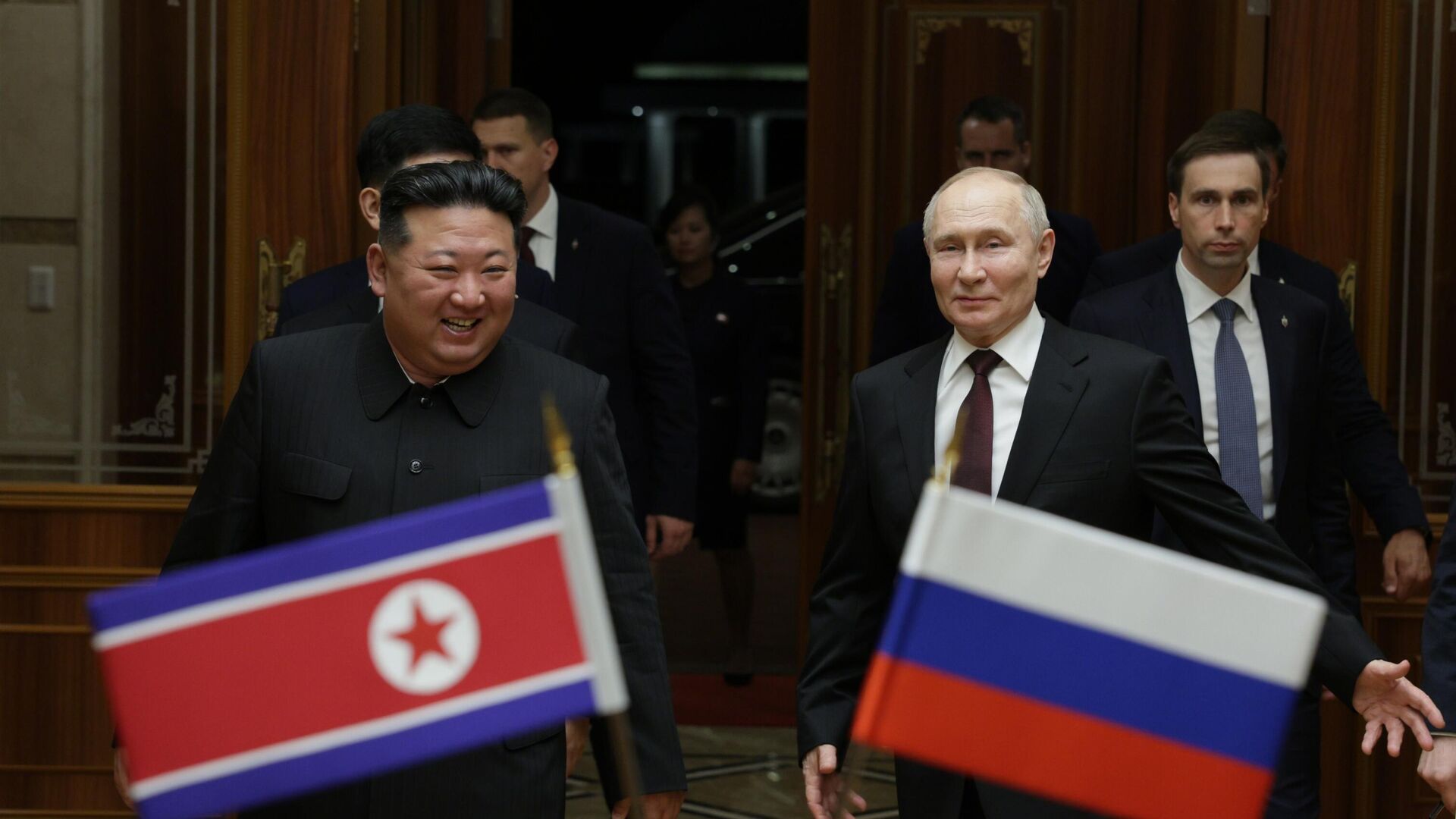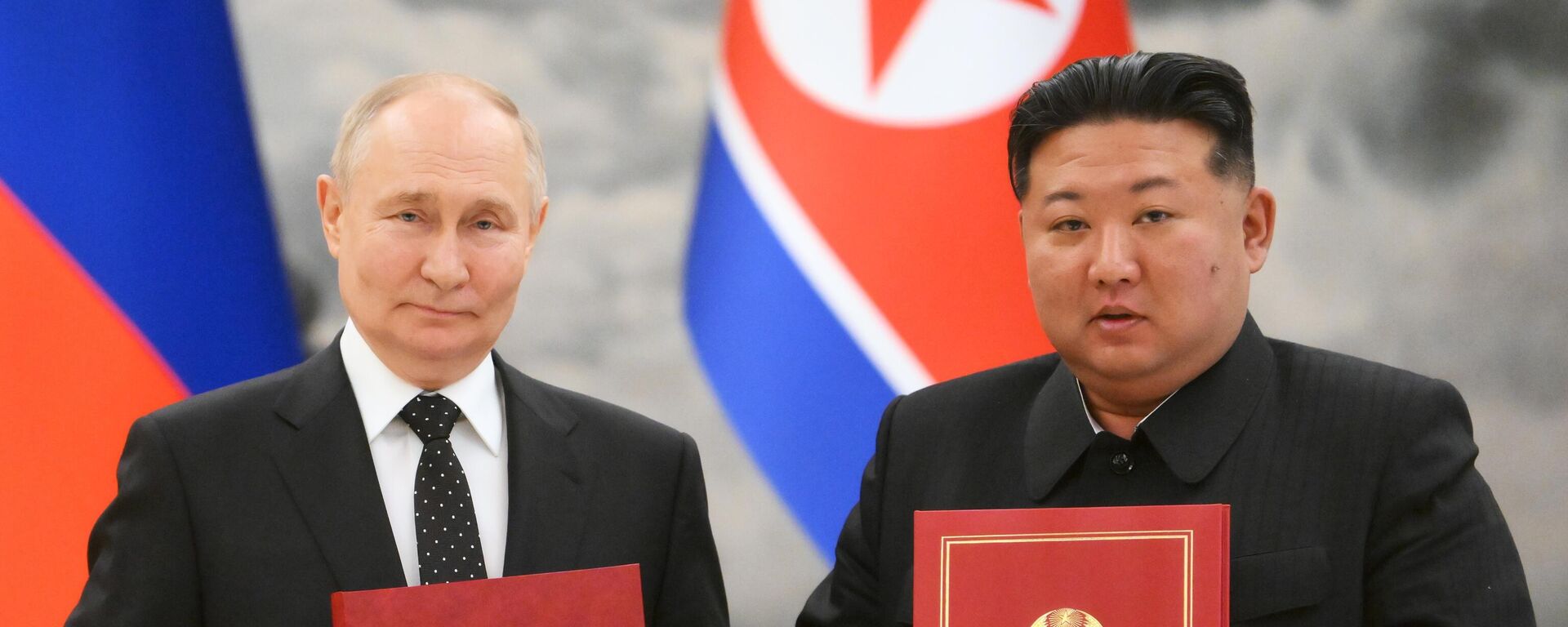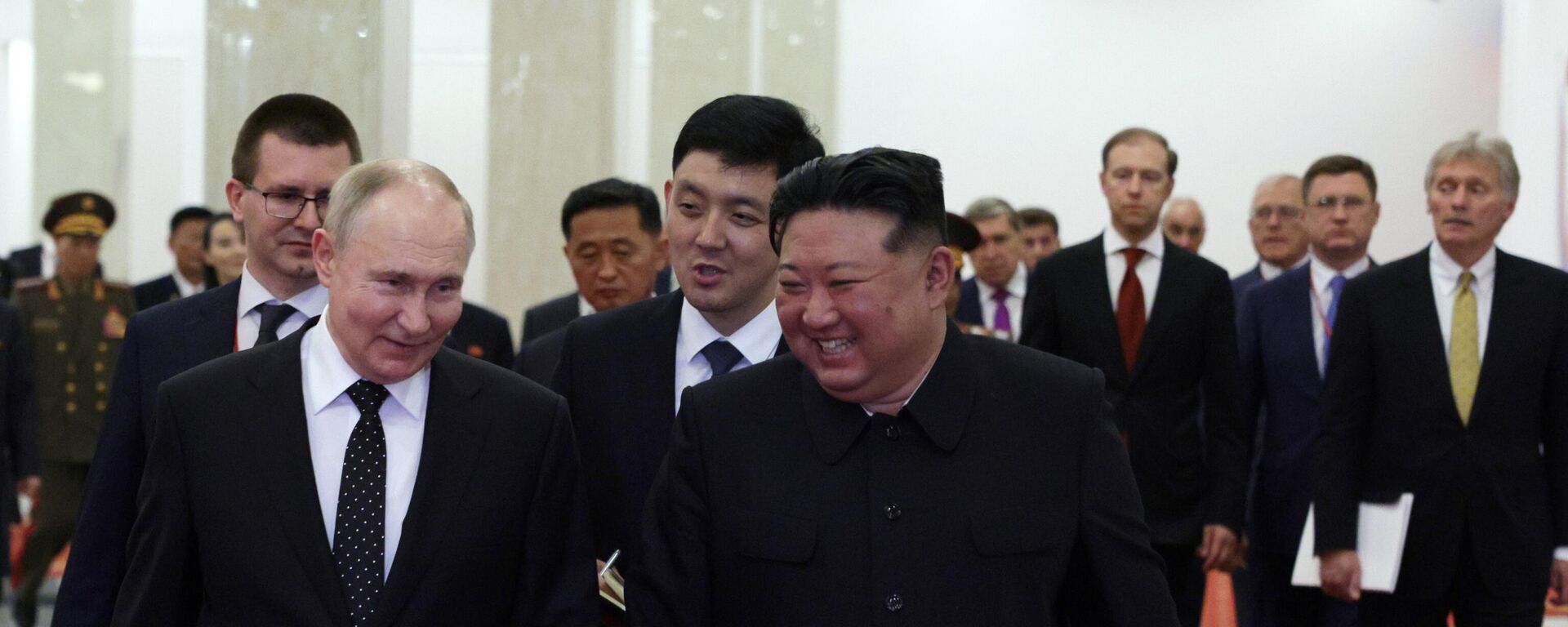https://sputnikglobe.com/20240623/upgraded-russianorth-korea-strategic-partnership-sends-west-strong-challenge--1119078297.html
Upgraded Russia–North Korea Strategic Partnership Sends West ‘Strong Challenge’
Upgraded Russia–North Korea Strategic Partnership Sends West ‘Strong Challenge’
Sputnik International
President Vladimir Putin’s visit to North Korea and the Comprehensive Strategic Partnership, he signed with Kim Jong Un should be seen as "a strong signal to the West," according to the Associated Press.
2024-06-23T15:48+0000
2024-06-23T15:48+0000
2024-06-23T17:56+0000
world
russia
north korea
vladimir putin
kim jong un
nato
strategic partnership
https://cdn1.img.sputnikglobe.com/img/07e8/06/17/1119079264_0:0:3022:1700_1920x0_80_0_0_e59441b65dd944bb5be70bbe59982c45.jpg
President Vladimir Putin’s visit to North Korea and the Comprehensive Strategic Partnership he signed with North Korea’s leader Kim Jong Un should be seen as "a strong signal to the West," according to the Associated Press.In NATO’s proxy conflict over Ukraine, Russia is prepared to “challenge Western interests like never before,” stated the US news agency.The newly-signed agreement “marked the strongest link between Moscow and Pyongyang since the end of the Cold War," it added. The authors recalled that Kim spoke of the new treaty as raising bilateral relations to the level of an alliance.Moscow "has nothing to lose," and is prepared to go “to the end” to achieve its goals in Ukraine, acknowledged the AP.Article 3 of the DPRK-Russia Treaty on Comprehensive Strategic Partnership states that, "in the event of an immediate threat of an act of armed aggression against one of the Parties, the Parties, at the request of one of the Parties, shall immediately use bilateral channels for consultations in order to coordinate their positions and agree on possible practical measures to assist each other to help eliminate the emerging threat."The news agency stressed that while in Pyongyang to sign the treaty, Putin noted statements by the US and other NATO countries on the supply of high-precision weapons systems and F-16 jet fighter aircraft to Ukraine for strikes on Russian territory. He doubled down on his May warning that NATO representatives must understand "what they are playing with" when discussing plans to allow Kiev to strike "legitimate targets" deep within Russian territory with missile systems transferred to the Ukrainian Armed Forces by the West.Russia could also provide long-range weapons to others, remarked Putin, echoing the West's argument that that they "have no control over what happens afterward."Russia could provide North Korea with help in "areas where its capabilities are still nascent,” the AP suggested.Kremlin Spokesman Dmitry Peskov called the reaction of the West to the state visits of the Russian President to North Korea and Vietnam predictable, and perceived with hostility.Peskov remarked that any foreign relations move by Russia "is perceived, probably, through the prism of the main direction of Western aspirations to suppress Russia and all its activities."He also noted that Russia's cooperation with other states is in no way directed against third countries.
https://sputnikglobe.com/20240620/full-text-of-russia-north-korea-strategic-agreement--1119035258.html
https://sputnikglobe.com/20240619/putins-north-korea-visit-directly-challenges-us-regional-clout-1119025861.html
russia
north korea
Sputnik International
feedback@sputniknews.com
+74956456601
MIA „Rossiya Segodnya“
2024
News
en_EN
Sputnik International
feedback@sputniknews.com
+74956456601
MIA „Rossiya Segodnya“
Sputnik International
feedback@sputniknews.com
+74956456601
MIA „Rossiya Segodnya“
putin visits north korea, russia north korea defense pact, russia north korea agreement, russia north korea defense, putin korea treaty, putin north korea kim, kim putin agreement, putin kim meeting
putin visits north korea, russia north korea defense pact, russia north korea agreement, russia north korea defense, putin korea treaty, putin north korea kim, kim putin agreement, putin kim meeting
Upgraded Russia–North Korea Strategic Partnership Sends West ‘Strong Challenge’
15:48 GMT 23.06.2024 (Updated: 17:56 GMT 23.06.2024) Russia's newly-inked Comprehensive Strategic Partnership Agreement with North Korea is being dissected by Western media outlets, as they mull the implications of its clause on military aid between the two countries.
President Vladimir
Putin’s visit to North Korea and the
Comprehensive Strategic Partnership he signed with North Korea’s leader Kim Jong Un should be seen as "
a strong signal to the West," according to the Associated Press.
In NATO’s proxy conflict over Ukraine, Russia is prepared to “challenge Western interests like never before,” stated the US news agency.
The newly-signed agreement “marked the strongest link between Moscow and Pyongyang since the end of the Cold War," it added. The authors recalled that Kim spoke of the new treaty as raising bilateral relations to the level of an alliance.
Putin and Kim signed a Comprehensive Strategic Partnership Agreement that aims to serve as a roadmap for future bilateral cooperation in all spheres. The document on comprehensive partnership provides, among other things, for mutual military assistance in case of aggression against one of the participants. The Russian president also denounced the "indefinite restrictions regime" imposed on North Korea by the UN Security Council (UNSC), which includes an arms embargo, as "orchestrated by the US" and called for it to be revised.
Moscow "has nothing to lose," and is prepared to go “to the end” to achieve its goals in Ukraine, acknowledged the AP.
Article 3 of the
DPRK-Russia Treaty on Comprehensive Strategic Partnership states that, "in the event of an immediate threat of an act of armed aggression against one of the Parties, the Parties, at the request of one of the Parties, shall immediately use bilateral channels for consultations in order to coordinate their positions and agree on possible practical measures to
assist each other to help eliminate the emerging threat."
Article 4 goes on to say: "If one of the Parties is subjected to an armed attack by any state or several states and thus finds itself in a state of war, the other Party will immediately provide military and other assistance with all means at its disposal in accordance with Article 51 of the UN Charter and in accordance with legislation of the Democratic People's Republic of Korea and the Russian Federation."
The news agency stressed that while in Pyongyang to sign the treaty, Putin noted statements by the US and other NATO countries on the supply of high-precision weapons systems and F-16 jet fighter aircraft to Ukraine for
strikes on Russian territory. He doubled down on his May warning that
NATO representatives must understand "
what they are playing with" when discussing plans to allow Kiev to strike "
legitimate targets" deep within Russian territory with missile systems transferred to the Ukrainian Armed Forces by the West.
Russia could also provide long-range weapons to others, remarked Putin, echoing the West's argument that that they "have no control over what happens afterward."
Russia could provide North Korea with help in "areas where its capabilities are still nascent,” the AP suggested.
Kremlin Spokesman Dmitry Peskov called the reaction of the West to the state visits of the Russian President to North Korea and Vietnam predictable, and perceived with hostility.
Peskov remarked that
any foreign relations move by Russia "
is perceived, probably, through the prism of the main direction of Western aspirations to suppress Russia and all its activities."
He also noted that Russia's cooperation with other states is in no way directed against third countries.




